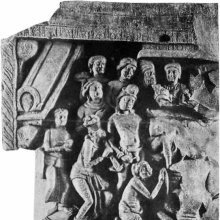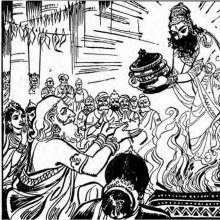Duta, Dūta, Dutaya: 28 definitions
Introduction:
Duta means something in Buddhism, Pali, Hinduism, Sanskrit, the history of ancient India, Marathi, Hindi. If you want to know the exact meaning, history, etymology or English translation of this term then check out the descriptions on this page. Add your comment or reference to a book if you want to contribute to this summary article.
Alternative spellings of this word include Doot.
Images (photo gallery)
In Hinduism
Dharmashastra (religious law)
Source: Wisdom Library: Dharma-śāstraDūta (दूत) refers to “ambassador”, to be carefully appointed by the king. The ambassadors should be intelligent, pure-hearted man of noble family, efficient, well-versed in all the Śāstras, and capable of interpreting other men’s feelings from their means and demeanors. It is used throughout Dharmaśāstra literature such as the Manusmṛti and the Baudhāyana-dharmasūtra. (also see the Manubhāṣya verse 7.63 et seq.)

Dharmashastra (धर्मशास्त्र, dharmaśāstra) contains the instructions (shastra) regarding religious conduct of livelihood (dharma), ceremonies, jurisprudence (study of law) and more. It is categorized as smriti, an important and authoritative selection of books dealing with the Hindu lifestyle.
Purana and Itihasa (epic history)
Source: archive.org: Shiva Purana - English TranslationDūta (दूत) refers to “emissaries” (of Śiva), according to the Śivapurāṇa 2.4.4 (“Search for Kārttikeya and his conversation with Nandin”).—Accordingly, as Brahmā narrated to Nārada: “Urged by the gods, sages and mountains, the lord sent his Gaṇas as his emissaries to the place where his son was staying. [...] All the emissaries (dūta) of Śiva went and haughtily encircled the abode of the Kṛttikās with various miraculous weapons in their hands. On seeing them the Kṛttikās were extremely terrified. They spoke to Kārttikeya blazing with divine splendour”.
Source: Cologne Digital Sanskrit Dictionaries: The Purana IndexDūta (दूत).—A messenger: to report as he has been told and to be skilled in languages of different countries; one who can adjust according to time and place;1 of Indra to Tāraka to get him ready for war after the birth of Kārttikeya;2 of Pauṇḍraka.3
Source: JatLand: List of Mahabharata people and placesDūta (दूत) is a name mentioned in the Mahābhārata (cf. II.28.50) and represents one of the many proper names used for people and places. Note: The Mahābhārata (mentioning Dūta) is a Sanskrit epic poem consisting of 100,000 ślokas (metrical verses) and is over 2000 years old.

The Purana (पुराण, purāṇas) refers to Sanskrit literature preserving ancient India’s vast cultural history, including historical legends, religious ceremonies, various arts and sciences. The eighteen mahapuranas total over 400,000 shlokas (metrical couplets) and date to at least several centuries BCE.
Natyashastra (theatrics and dramaturgy)
Source: Wisdom Library: Nāṭya-śāstraDūta (दूत, “messenger”) refers to one of the twenty-one sandhyantara, or “distinct characteristics of segments (sandhi)” according to the Nāṭyaśāstra chapter 21. The segments are divisions of the plot (itivṛtta or vastu) of a dramatic play (nāṭaka) and consist of sixty-four limbs, known collectively as the sandhyaṅga.

Natyashastra (नाट्यशास्त्र, nāṭyaśāstra) refers to both the ancient Indian tradition (shastra) of performing arts, (natya—theatrics, drama, dance, music), as well as the name of a Sanskrit work dealing with these subjects. It also teaches the rules for composing Dramatic plays (nataka), construction and performance of Theater, and Poetic works (kavya).
Arthashastra (politics and welfare)
Source: Wisdom Library: ArthaśāstraDūta (दूत) refers to “envoys” and represents an official title used in the political management of townships in ancient India. Officers, ministers, and sovereigns bearing such titles [eg., Dūta] were often present in ancient inscriptions when, for example, the king wanted to address his subjects or make an important announcement.

Arthashastra (अर्थशास्त्र, arthaśāstra) literature concerns itself with the teachings (shastra) of economic prosperity (artha) statecraft, politics and military tactics. The term arthashastra refers to both the name of these scientific teachings, as well as the name of a Sanskrit work included in such literature. This book was written (3rd century BCE) by by Kautilya, who flourished in the 4th century BCE.
Ayurveda (science of life)
Toxicology (Study and Treatment of poison)
Source: Shodhganga: Kasyapa Samhita—Text on Visha ChikitsaDūta (दूत) refers to the “messenger” (who informs the snake-bite expert of the condition of the victim), as taught in the Damśarūpa (“aspects of snake-bites”) section of the Kāśyapa Saṃhitā: an ancient Sanskrit text from the Pāñcarātra tradition dealing with both Tantra and Viṣacikitsā—an important topic from Āyurveda which deals with the study of Toxicology (Agadatantra or Sarpavidyā).—The concluding portions of the fourth chapter (90-101) of the Kāśyapasaṃhitā deals with the features of the messenger from whom a physician can ascertain whether a snake-bite victim can be cured or not. The messenger’s news regarding snake bite is deemed to be auspicious if delivered on Monday, Thursday, Friday and Saturday while the other days are considered inauspicious and malefic in nature.
The Messenger (Dūta) or one of the family members is sent to the local snake-bite expert when a person is bitten by a snake. Drawing on the Tantric teachings gleaned from Tantra works, he looks for omens connected to the arrival of the dūta or messenger, interrogates him about the nature and time of the bite, the type of snake and so on, and then decides whether the victim is treatable. Depending on the exigency of the victim, he treats him with herbal antidotes, or a ritualistic procedure or both.
Unclassified Ayurveda definitions
Source: Ancient Science of Life: Snake bite treatment in Prayoga samuccayamDūta (दूत) refers to the “informer”, whose features (lakṣaṇa) are dealt with in the 20th century Prayogasamuccaya (one of the most popular and widely practised book in toxicology in Malayalam).—The tenth chapter deals with dūta-lakṣaṇas (features of the informer). Features of an informer which bring about good prognosis and the vice-versa are detailed. Twelve nakṣatras (asterisms) which are inauspicious in poisoning cases are explained on the basis of lunar calculations. The text gives a description of detection of the type of snake to be deduced form the position of the informer in the physician’s room. If the dūta (informer) utters the snake’s name first, then the death of the patient is almost inevitable. Prognosis was also assessed by counting the words uttered by the informer. The place where the snake bite happened and the sex of snake can also be deduced from informer. The part of body bitten and intensity also can be deduced from the informer’s and physician’s positions.

Āyurveda (आयुर्वेद, ayurveda) is a branch of Indian science dealing with medicine, herbalism, taxology, anatomy, surgery, alchemy and related topics. Traditional practice of Āyurveda in ancient India dates back to at least the first millenium BC. Literature is commonly written in Sanskrit using various poetic metres.
Jyotisha (astronomy and astrology)
Source: Wisdom Library: Brihat Samhita by VarahamihiraDūta (दूत) refers to “messengers” (working for the king), according to the Bṛhatsaṃhitā (chapter 2), an encyclopedic Sanskrit work written by Varāhamihira mainly focusing on the science of ancient Indian astronomy astronomy (Jyotiṣa).—Accordingly, “We shall now proceed to give a brief description of (the qualifications of) a jyotiṣaka. [...] He must be able to interpret the language and gestures of fighting men and the like; he must be learned in the Ṣaḍguṇa and Upāya policies; he must be able to predict the success or failure of an undertaking; he must be able to interpret omens; he must have a knowledge of favourable halting places for the king’s army; he must be able to interpret the colour of ceremonial fires; he must know when to employ the ministers, spies, messengers [i.e., dūta] and forest men; he must be able to give directions touching the captures of the enemy’s fortress”.

Jyotisha (ज्योतिष, jyotiṣa or jyotish) refers to ‘astronomy’ or “Vedic astrology” and represents the fifth of the six Vedangas (additional sciences to be studied along with the Vedas). Jyotisha concerns itself with the study and prediction of the movements of celestial bodies, in order to calculate the auspicious time for rituals and ceremonies.
In Buddhism
Tibetan Buddhism (Vajrayana or tantric Buddhism)
Source: Wisdom Library: Tibetan BuddhismDūta (दूत) refers to a group of beings mentioned as attending the teachings in the 6th century Mañjuśrīmūlakalpa: one of the largest Kriyā Tantras devoted to Mañjuśrī (the Bodhisattva of wisdom) representing an encyclopedia of knowledge primarily concerned with ritualistic elements in Buddhism. The teachings in this text originate from Mañjuśrī and were taught to and by Buddha Śākyamuni in the presence of a large audience (including the Dūtas).
Source: academia.edu: The Structure and Meanings of the Heruka MaṇḍalaDūta (दूत) is the name of a Vīra (hero) who, together with the Ḍākinī named Dūtinī forms one of the 36 pairs situated in the Guṇacakra, according to the 10th century Ḍākārṇava chapter 15. Accordingly, the guṇacakra refers to one of the four divisions of the sahaja-puṭa (‘innate layer’), situated within the padma (lotus) in the middle of the Herukamaṇḍala. The 36 pairs of Ḍākinīs and Vīras [viz., Dūta] are whitish red in color; they each have one face and four arms; they hold a skull bowl, a skull staff, a small drum, and a knife.

Tibetan Buddhism includes schools such as Nyingma, Kadampa, Kagyu and Gelug. Their primary canon of literature is divided in two broad categories: The Kangyur, which consists of Buddha’s words, and the Tengyur, which includes commentaries from various sources. Esotericism and tantra techniques (vajrayāna) are collected indepently.
Mahayana (major branch of Buddhism)
Source: Wisdom Library: Maha Prajnaparamita SastraDūta (दूत) refers to a “messengers”, according to Mahāprajñāpāramitāśāstra (chapter 22, v2).—Accordingly, “[...] Thus one night in his palace, the Bodhisattva Śākyamuni saw that his courtesans were like corpses. The Devas and the Asuras of the ten directions, bearing banners and flowers came to offer them to him and, bearing themselves respectfully on meeting him, escorted him outside. Then Tch’ö-ni (Chandaka), despite the orders he had previously received from king Tsing-fan (Śuddhodana), acceded to the wishes of the Bodhisattva and brought him his horse [Kaṇṭhaka]. The four kings, messengers of the gods (deva-dūta), held the horse’s hoofs in their hands while it leaped over the ramparts and left he city. [...]”.

Mahayana (महायान, mahāyāna) is a major branch of Buddhism focusing on the path of a Bodhisattva (spiritual aspirants/ enlightened beings). Extant literature is vast and primarely composed in the Sanskrit language. There are many sūtras of which some of the earliest are the various Prajñāpāramitā sūtras.
India history and geography
Source: Cologne Digital Sanskrit Dictionaries: Indian Epigraphical GlossaryDūta.—(IE 8-3; EI 23, 30; CII 1; HD), a messenger or envoy. See Viṣṇudharmottara, II. 24. 13-14, 28; CII, Vol. I, p. 67. (EI 23; CII 3, 4), an occasional substitute for Dūtaka, the executor of a grant. Note: dūta is defined in the “Indian epigraphical glossary” as it can be found on ancient inscriptions commonly written in Sanskrit, Prakrit or Dravidian languages.

The history of India traces the identification of countries, villages, towns and other regions of India, as well as mythology, zoology, royal dynasties, rulers, tribes, local festivities and traditions and regional languages. Ancient India enjoyed religious freedom and encourages the path of Dharma, a concept common to Buddhism, Hinduism, and Jainism.
Languages of India and abroad
Pali-English dictionary
Source: BuddhaSasana: Concise Pali-English Dictionarydūta : (m.) a messenger; envoy.
Source: Sutta: The Pali Text Society's Pali-English Dictionary1) Dūta, 2 (nt.) (Sk. dyūta, see jūta) play, gaming, gambling J.IV, 248. (Page 328)
2) Dūta, 1 (Ved. dūta, prob. to dūra (q. v.) as “one who is sent (far) away, ” also perhaps Gr. dou=los slave. See Walde, Lat. Wtb. under dudum) a messenger, envoy Vin.I, 16; II, 32, 277; D.I, 150; S.IV, 194; Sn.411 (rāja°), 417. ‹-› deva° Yama’s envoy, Death’s messenger A.I, 138, 142; M.II, 75 sq.; J.I, 138.—°ṃ pāheti to send a messenger Miln.18, PvA.133. (Page 328)

Pali is the language of the Tipiṭaka, which is the sacred canon of Theravāda Buddhism and contains much of the Buddha’s speech. Closeley related to Sanskrit, both languages are used interchangeably between religions.
Marathi-English dictionary
Source: DDSA: The Molesworth Marathi and English Dictionarydūta (दूत).—m (S) A messenger or an envoy; a carrier of errands or intelligence. Ex. dēvadūta, rājadūta, yamadūta, viṣṇudūta, śivadūta.
Source: DDSA: The Aryabhusan school dictionary, Marathi-Englishduta (दुत).—m A messenger or an envoy; a carrier of errands or intelligence.
Marathi is an Indo-European language having over 70 million native speakers people in (predominantly) Maharashtra India. Marathi, like many other Indo-Aryan languages, evolved from early forms of Prakrit, which itself is a subset of Sanskrit, one of the most ancient languages of the world.
Sanskrit dictionary
Source: DDSA: The practical Sanskrit-English dictionaryDūta (दूत).—[cf. Uṇādi-sūtra 3.9]
1) A messenger; अर्थानर्थान्तरे बुद्धिर्निश्चितापि न शोभते । घातयन्ति हि कार्याणि दूताः पण्डितमानिनः (arthānarthāntare buddhirniścitāpi na śobhate | ghātayanti hi kāryāṇi dūtāḥ paṇḍitamāninaḥ) || Rām.5.3.38.
2) An envoy, an ambassador; Chāṇ.16.
Derivable forms: dūtaḥ (दूतः).
See also (synonyms): dūtaka.
Source: Cologne Digital Sanskrit Dictionaries: Shabda-Sagara Sanskrit-English DictionaryDūta (दूत).—mfn.
(-taḥ-tā-taṃ) Sent, despatched. m.
(-taḥ) 1. A messenger or envoy, a news-carrier. 2. An ambassador. f. (-tiḥ-tī) A female messenger, a confidante, a procuress, a go-between. &c. E. du to go, Unadi affix kta, and the vowel made long; or dū to suffer, affix kta fem. affix ktin or ktic and optionally ṅīp .
Source: Cologne Digital Sanskrit Dictionaries: Benfey Sanskrit-English DictionaryDūta (दूत).—I. m. A messenger, an envoy, [Mānavadharmaśāstra] 3, 163.
Source: Cologne Digital Sanskrit Dictionaries: Cappeller Sanskrit-English DictionaryDūta (दूत).—[masculine] messenger, ambassador, envoy, gobetween; [feminine] ī (also dūti) [especially] confidante, procuress.
Source: Cologne Digital Sanskrit Dictionaries: Monier-Williams Sanskrit-English Dictionary1) Duta (दुत):—[from dū] mfn. pained, afflicted, [Śiśupāla-vadha vi, 59.]
2) Dūta (दूत):—m. ([probably] [from] √1. du; cf. dūra) a messenger, envoy, ambassador, negotiator, [Ṛg-veda; Atharva-veda; Śatapatha-brāhmaṇa; Mahābhārata] etc. (taya [Nominal verb] [Parasmaipada] yati, to employ as m° or a°, [Naiṣadha-carita])
Source: Cologne Digital Sanskrit Dictionaries: Yates Sanskrit-English DictionaryDūta (दूत):—(taḥ) 1. m. A messenger, envoy. f. (tiḥ-tī) A confidante. a. Sent.
Source: DDSA: Paia-sadda-mahannavo; a comprehensive Prakrit Hindi dictionary (S)Dūta (दूत) in the Sanskrit language is related to the Prakrit word: Dūa.
[Sanskrit to German]
Sanskrit, also spelled संस्कृतम् (saṃskṛtam), is an ancient language of India commonly seen as the grandmother of the Indo-European language family (even English!). Closely allied with Prakrit and Pali, Sanskrit is more exhaustive in both grammar and terms and has the most extensive collection of literature in the world, greatly surpassing its sister-languages Greek and Latin.
Hindi dictionary
Source: DDSA: A practical Hindi-English dictionary1) Duta (दुत) [Also spelled dut]:—(ind) avaunt !, be gone !
2) Dūta (दूत) [Also spelled doot]:—(nm) a messenger, courier; legate; an emissary, envoy; -[karmaṃ] (the job of) message-carrying; envoyship.
...
Kannada-English dictionary
Source: Alar: Kannada-English corpusDūta (ದೂತ):—
1) [noun] a man whose duty is to carry a message or to go on an errand for another; a messenger.
2) [noun] a diplomatic agent or representative appointed by one country to represent it in another; an envoy or ambassador.
3) [noun] an intermediary or conciliator between persons or sides; a mediator.
4) [noun] a male servant appointed for carrying out one’s personal, domestic or menial work.
--- OR ---
Dūtaya (ದೂತಯ):—[noun] a set of two similar or corresponding things; a pair.
Kannada is a Dravidian language (as opposed to the Indo-European language family) mainly spoken in the southwestern region of India.
See also (Relevant definitions)
Starts with (+25): Duta Jataka, Duta-praishanika, Duta-preshanika, Dutabasa, Dutada, Dutadisu, Dutadu, Dutaghni, Dutaka, Dutakara, Dutakarana, Dutakarman, Dutaki, Dutalakshana, Dutaleho, Dutamocana, Dutamukha, Dutangada, Dutapariksha, Dutappaya.
Ends with (+55): Abhipanduta, Agniduta, Agraduta, Amtakaduta, Anritaduta, Anuduta, Apanduta, Ashvaduta, Bhramaraduta, Bhringaduta, Birduta, Caitraduta, Candraduta, Cittamuduta, Devaduta, Dhaduta, Ganduta, Guptaduta, Hamsaduta, Hariduta.
Full-text (+149): Dutaghni, Yamaduta, Madhuduta, Dautya, Dutatva, Duta-preshanika, Devaduta, Pratiduta, Varnaduta, Dutaka, Ramaduta, Meghaduta, Dutalakshana, Dua, Duti, Dutamukha, Dutitva, Mahaduta, Dutya, Rajabhata.
Relevant text
Search found 47 books and stories containing Duta, Dūta, Dutaya, Dūtaya; (plurals include: Dutas, Dūtas, Dutayas, Dūtayas). You can also click to the full overview containing English textual excerpts. Below are direct links for the most relevant articles:
Warfare and Military System in Vedic Literature (by Rinki Deka)
Military Espionage < [Chapter 2 - Military System as Revealed in the Vedic Texts]
Religious Beliefs and other Practices related to Warfare < [Chapter 3 - The Religious observances and other Beliefs related to the Warfare]
Rig Veda (translation and commentary) (by H. H. Wilson)
Shishupala-vadha (Study) (by Shila Chakraborty)
Dūta according to the Manusaṃhitā < [Chapter 2a - Activities of ambassador (Dūta)]
Dūta according to the Arthaśātra < [Chapter 2a - Activities of ambassador (Dūta)]
Garga Samhita (English) (by Danavir Goswami)
Verse 4.14.13 < [Chapter 14 - The Story of the Jālandharīs]
Verse 4.6.7 < [Chapter 6 - The Story of the Ayodhyā Women]
Verse 6.4.8 < [Chapter 4 - Journey to the City of Kuṇḍina]
Amarakoshodghatana of Kshirasvamin (study) (by A. Yamuna Devi)
Politics and Administration (2): Defence and Foreign Policy < [Chapter 3 - Social Aspects]
Brihad Bhagavatamrita (commentary) (by Śrī Śrīmad Bhaktivedānta Nārāyana Gosvāmī Mahārāja)
Verse 1.5.7 < [Chapter 5 - Priya (the beloved devotees)]
Verse 1.4.76 < [Chapter 4 - Bhakta (the devotee)]
Verse 1.7.157-158 < [Chapter 7 - Pūrṇa (pinnacle of excellent devotees)]


